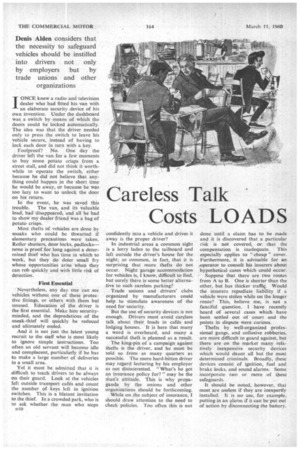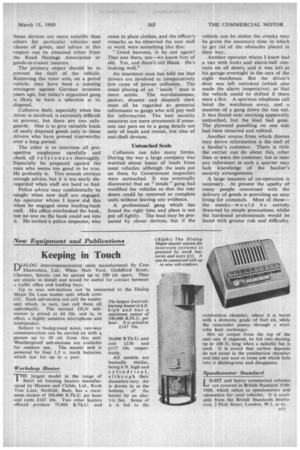Careless Talk
Page 64

Page 65

If you've noticed an error in this article please click here to report it so we can fix it.
Costs LOADS Denis Alden considers that the necessity to safeguard vehicles should be instilled into drivers not only by employers but by trade unions and other
organizations
IONCE knew a radio and television dealer who had fitted his van with an elaborate security device of his own invention. Under the dashboard was a switch by means of which the doors could be locked automatically. The idea was that the driver needed only to press the switch to leave his vehicle secure, instead of having to lock each door in turn with a key.
Foolproof? No. One day the driver left the van for a few moments to buy some potato crisps from a street stall, and did not think it worthwhile to operate the switch, either because he did not believe that anything could happen in the short time he would be away, or because he was too lazy to want to unlock the door on his return.
In the event, he was saved this trouble. The van, and its valuable load, had disappeared, and all he had to show my dealer friend was a bag of potato crisps.
Most thefts of vehicles are done by sneaks who could be thwarted if elementary precautions were taken. Roller shutters, door locks, padlocks— none is proof for long against a determined thief who has time in which to work, but the' do deter small fry whose opportunities arise when they can rob quickly and with little risk of detection.
First Essential
Nevertheless, any day one can see vehicles without one of these protective fittings, or others with them but unused. Education of the driver is the first essential. Make him securityminded, and the depredations of the sneak-thief will quickly be reduced and ultimately ended.
And it is not just the latest young recruit to the staff who is most likely to ignore simple instructions. Too often an old servant will become idle and complacent, particularly if he has to make a large number of deliveries in a small area.
Yet it must be admitted that it is difficult to teach drivers to be always on their guard. Look at the vehicles left outside transport cafés and count the number of keys left in ignition switches. This is a blatant invitation to the thief. In a crowded park, who is to ask whether the man who steps
D 1 0
confidently into a vehicle and drives it away is the proper driver?
In industrial areas a common sight is a lorry laden to the tailboard and left outside the driver's house for the night: so common, in fact, that it is surprising that more thefts do not occur. Night garage accommodation for vehicles is, I know, difficult to find, but surely there is some better alternative to such careless parking?
Trade unions and drivers' clubs organized by manufacturers could help to stimulate awareness of -the need for security.
But the use of security devices is not enough. Drivers must avoid careless talk about their loads in cafés and lodging houses. It is here that many a word is overheard, and many a successful theft is planned as a result.
The king-pin of a campaign against thefts is the driver, and he must be told so from as many quarters as possible. The more hard-bitten driver may regard lecturing by his employer as not disinterested. "What's he got an insurance policy for?" may be the man's attitude. This is why propaganda by the unions and other organizations should be forthcoming.
While on the subject of insurance, I should draw attention to the need to check policies. Too often this is not
done until a claim has to be made and it is discovered that a particular risk is not covered, or that the compensation is inadequate. This especially applies to " cheap " cover. Furthermore, it is advisable for an ,operator to consult his insurers about hypothetical cases which could occur.
• Suppose that there are two routes from A to B. One is shorter than the other, but has thicker trafN. Would the insurers repudiate liability if a vehicle were stolen while on the longer route? This, believe me, is not a fanciful question. I have recently heard of several cases which have been settled out of court and the points in dispute were curious.
Thefts by well-organized professional gangs, and collusive robberies, are more difficult to guard against, but there are on the market many relatively inexpensive security devices which would daunt all but the most determined criminals. Broadly, these devices consist of ignition, fuel and brake locks, and sound alarms. Some incorporate two or more of these safeguards.
It should be noted, however, that most are useless if they are inexpertly installed. It is no use, for example, putting in an alarm if it can be put out of action by disconnecting the battery, Some devices are more suitable than others for particular vehicles and classes of goods, and advice in this respect can be obtained either from the Road Haulage Association or goods-in-transit insurers.
The primary object should be to prevent the theft of the vehicle. Removing the rotor arm, on a petrol vehicle, may have been a cunning stratagem against German invasion years ago, but today's organized gang is likely to have a selection at its disposal.
Collusive theft, especially when the driver is involved, is extremely difficult to prevent, but there are two safeguards. One is to give valuable loads of easily disposed goods only to those drivers who have proved trustworthy over a long period.
The other is to interview all prospective employees carefully and check all ref er enc es thoroughly. Especially be prepared against the man who seems too good to be true. He probably is. This sounds obvious enough advice, but it is too easily disregarded when staff are hard to find.
Police advice may confidentially be sought when new staff are engaged. An operator whom I knew did this when he engaged some loading-bank staff. His office overlooked the bank, but no one on the bank could see into it. He invited a police inspector, who
came in plain clothes, and the officer's remarks as he observed the new staff at work were something like this: "Good heavens, is he out again? That one there, too—we know him of old. Yes, and there's old Blank. He's looking well."
An insurance man has told me that drivers are involved in comparatively few cases of proven collusion. The usual placing of an " inside " man is more subtle. The warehouseman, packer, shunter and • dispatch clerk must all be regarded as potential informants to gangs who will pay well for information. The best security measures are mere ornaments if someone can pass on to a gang details not only of loads and routes, but also of anti-theft devices.
Untouched Seals Collusion can take many forms. During the war a large company was worried about losses of loads from meat vehicles, although the seals put on them by Government inspectors were untouched. It was eventually discovered that an "inside" gang had modified the vehicles so that the rear doors could be removed as complete units without leaving any evidence.
A professional gang which has found the right time and place is not put off lightly. The load may be protected by clever devices, but if the
vehicle can be stolen the crooks may be given the necessary time in which to get rid of the obstacles placed in their way.
Another operator whom I knew had a van with locks and alarm-bell contacts on all doors, and it was left in his garage overnight in the care of the night watchman. But the driver's door was left unlocked (which also made the alarm inoperative), so /that the vehicle could be shifted if there were a fire. A spurious telephone call lured the watchman away, and a member of a gang drove the van out. It was found next morning apparently untouched, but the load had gone. The plywood panelling on one side had been removed and refitted.
Another source from which thieves may derive information is the staff of a haulier's customer. There• is little the carrier can do about this, other than to warn the customer, but at least any informant in such a quarter may lack knowledge of the haulier's. security 'arrangements.
A large measure of co-operation is necessary. At present the apathy ofmany people concerned with the delivery of goods is providing an easy living for criminals. Most of these— the sneaks—'w ould be entirely thwarted by simple precautions, whilst the hardened professionals would be faced with greater risk and difficulty.




































































































































